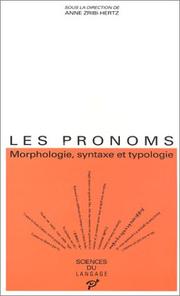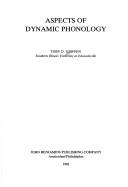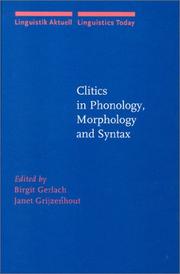| Listing 1 - 10 of 1058 | << page >> |
Sort by
|
Book
ISBN: 9783035265989 3035265984 3035297517 Year: 2016 Publisher: S.l. : Peter Lang AG,
Abstract | Keywords | Export | Availability | Bookmark
 Loading...
Loading...Choose an application
- Reference Manager
- EndNote
- RefWorks (Direct export to RefWorks)
Inscrit depuis quarante ans dans le domaine de la syntaxe, le phénomène de l?antipassif est traditionnellement associé aux langues à alignement ergatif. Ce travail cherche donc à savoir si la corrélation de l?antipassif avec l?alignement ergatif se vérifie sur l?axe translinguistique. En d?autres termes, jusqu?à quel point doit-on insister sur la dépendance entre l?antipassif et l?alignement ergatif ? Pour comprendre pourquoi le phénomène de l?antipassif a longtemps été négligé dans la description des langues accusatives et quels sont les arguments en faveur d?une telle analyse, cette étude s?appuie sur une approche translinguistique et sur une vision bipolaire relative aux domaines de la syntaxe et de la sémantique. 0Dans cet ouvrage, l?auteur s?attache à l?analyse descriptive des constructions antipassives formellement marquées. Étant donné qu?une certaine proportion de langues ergatives utilise, pour dériver l?antipassif, la marque polysémique réfléchie et/ou réciproque, cette étude s?est penchée sur les langues accusatives dont la marque antipassive présente la même caractéristique, d?où l?intérêt porté aux langues austronésiennes, du Niger-Congo, Nilo-sahariennes, turciques, et indoeuropéennes, en particulier aux langues slaves et romanes.
Grammar, Comparative and general. --- Comparative grammar --- Grammar --- Grammar, Philosophical --- Grammar, Universal --- Language and languages --- Philosophical grammar --- Linguistics --- Philology --- Grammar, Comparative
Book
ISBN: 3110811634 9027924317 Year: 1973 Publisher: De Gruyter
Abstract | Keywords | Export | Availability | Bookmark
 Loading...
Loading...Choose an application
- Reference Manager
- EndNote
- RefWorks (Direct export to RefWorks)
To celebrate the 270th anniversary of the De Gruyter publishing house, the company is providing permanent open access to 270 selected treasures from the De Gruyter Book Archive. Titles will be made available to anyone, anywhere at any time that might be interested. The DGBA project seeks to digitize the entire backlist of titles published since 1749 to ensure that future generations have digital access to the high-quality primary sources that De Gruyter has published over the centuries.
Grammar, Comparative and general. --- Comparative grammar --- Grammar --- Grammar, Philosophical --- Grammar, Universal --- Language and languages --- Philosophical grammar --- Linguistics --- Philology --- Grammar, Comparative
Book
ISBN: 0191780154 0191019771 0198709846 1322222819 9780191019777 9780198709848 9780191780158 Year: 2014 Publisher: Oxford, United Kingdom
Abstract | Keywords | Export | Availability | Bookmark
 Loading...
Loading...Choose an application
- Reference Manager
- EndNote
- RefWorks (Direct export to RefWorks)
This volume examines the conflicting factors that shape the content and form of grammatical rules in language, which speakers and addressees need to contend with when expressing themselves and when trying to comprehend messages. Chapters examine adult language, first and second language acquisition, and the motivations behind historical change.
Grammar, Comparative and general. --- Comparative grammar --- Grammar --- Grammar, Philosophical --- Grammar, Universal --- Language and languages --- Philosophical grammar --- Linguistics --- Philology --- Grammar, Comparative
Book
ISSN: 14343452 ISBN: 3110295407 3110295393 9783110295399 9783110295405 1299722598 9781299722590 9783110293869 3110293862 Year: 2013 Volume: 82 Publisher: Berlin Boston
Abstract | Keywords | Export | Availability | Bookmark
 Loading...
Loading...Choose an application
- Reference Manager
- EndNote
- RefWorks (Direct export to RefWorks)
Extra-grammatical morphology is a hitherto neglected area of research, highly marginalised because of its irregularity and unpredictability. Yet many neologisms in English are formed by means of extra-grammatical mechanisms, such as abbreviation, blending and reduplication, which therefore deserve both greater attention and more systematic study. This book analyses such phenomena.
Grammar, Comparative and general. --- Comparative grammar --- Grammar --- Grammar, Philosophical --- Grammar, Universal --- Language and languages --- Philosophical grammar --- Linguistics --- Philology --- Grammar, Comparative
Book
ISBN: 3111334317 9783111334318 3110987201 Year: 2017 Publisher: Berlin Boston
Abstract | Keywords | Export | Availability | Bookmark
 Loading...
Loading...Choose an application
- Reference Manager
- EndNote
- RefWorks (Direct export to RefWorks)
No detailed description available for "English existentials in functional grammar".
Grammar, Comparative and general. --- Comparative grammar --- Grammar --- Grammar, Philosophical --- Grammar, Universal --- Language and languages --- Philosophical grammar --- Linguistics --- Philology --- Grammar, Comparative

ISBN: 2842920279 Year: 1997 Publisher: Saint-Denis Presses universitaires de Vincennes
Abstract | Keywords | Export | Availability | Bookmark
 Loading...
Loading...Choose an application
- Reference Manager
- EndNote
- RefWorks (Direct export to RefWorks)
Grammar --- Grammar, Comparative and general --- -Comparative grammar --- Grammar, Philosophical --- Grammar, Universal --- Language and languages --- Philosophical grammar --- Linguistics --- Philology --- Pronoun --- Grammar, Comparative --- Pronoun. --- -Pronoun --- Pronouns --- Function words --- Nominals --- Reflexives
Book
ISBN: 2902709099 9782902709090 Year: 1979 Publisher: Grenoble Publ. de l'Université des langues et lettres
Abstract | Keywords | Export | Availability | Bookmark
 Loading...
Loading...Choose an application
- Reference Manager
- EndNote
- RefWorks (Direct export to RefWorks)
Grammar --- Grammar, Comparative and general --- Comparative grammar --- Grammar, Philosophical --- Grammar, Universal --- Language and languages --- Philosophical grammar --- Linguistics --- Philology --- Grammar, Comparative --- Grammar, Comparative and general.

ISBN: 9027235325 9786613314062 1283314061 9027279799 9789027279798 9789027235329 Year: 1985 Publisher: Amsterdam Philadelphia J. Benjamins
Abstract | Keywords | Export | Availability | Bookmark
 Loading...
Loading...Choose an application
- Reference Manager
- EndNote
- RefWorks (Direct export to RefWorks)
Dynamic phonology is the natural consequence of the combination of the latest developments in physiological and acoustic phonetics and the traditional structural/functional theories of linguistics. In phonetics, the segmental approach has long since given way to dynamic phonetics, leaving linguists in the position of either ignoring the dynamic evidence and continuing with segmental and semi-segmental phonology or of adopting the dynamic evidence within their overall theories of language structure and function. The author of this book has chosen the latter and here present a model for such
Phonetics --- Grammar, Comparative and general --- Phonology. --- -Comparative grammar --- Grammar --- Grammar, Philosophical --- Grammar, Universal --- Language and languages --- Philosophical grammar --- Linguistics --- Philology --- Phonology --- Grammar, Comparative --- Grammar, Comparative and general Phonology
Book
ISBN: 0521266173 Year: 1985 Publisher: Cambridge Cambridge University press
Abstract | Keywords | Export | Availability | Bookmark
 Loading...
Loading...Choose an application
- Reference Manager
- EndNote
- RefWorks (Direct export to RefWorks)
Linguistics --- Grammar --- Claus, Emile --- Grammar, Comparative and general --- -Comparative grammar --- Grammar, Philosophical --- Grammar, Universal --- Language and languages --- Philosophical grammar --- Philology --- Clauses --- Grammar, Comparative --- Clauses. --- -Clauses --- Sentences --- Syntax

ISBN: 9027227578 1556197993 9786612163395 1282163396 9027299196 9789027299192 9781556197994 9781282163393 6612163399 Year: 2000 Publisher: Amsterdam Philadelphia J. Benjamins
Abstract | Keywords | Export | Availability | Bookmark
 Loading...
Loading...Choose an application
- Reference Manager
- EndNote
- RefWorks (Direct export to RefWorks)
This paper explores the conjecture that clitic doubling in languages like Spanish shares some fundamental aspects of the semantics of inalienable possession, especially if understood in terms of a syntax of the kind originally advocated by Szabolcsi (1983). A few paradigms are discussed where this correlation would explain otherwise peculiar properties, concerning subtle details in the referentiality of clitic arguments and the aspectual properties of the event where they are taken to participate. In the process, the semantic nature of clitic doubling is shifted from the domain of the obscure or pleonastic to that of integral relations. The paper closes with a syntactic puzzle that the hypothesized correlation poses.
Grammar --- Grammar, Comparative and general --- Philology & Linguistics --- Languages & Literatures --- Comparative grammar --- Grammar, Philosophical --- Grammar, Universal --- Language and languages --- Philosophical grammar --- Linguistics --- Philology --- Clitics --- Grammar, Comparative
| Listing 1 - 10 of 1058 | << page >> |
Sort by
|

 Search
Search Feedback
Feedback About UniCat
About UniCat  Help
Help News
News